Quaternary structure - Study guides, Class notes & Summaries
Looking for the best study guides, study notes and summaries about Quaternary structure? On this page you'll find 1995 study documents about Quaternary structure.
Page 4 out of 1.995 results
Sort by
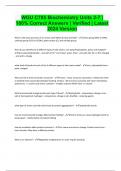
-
WGU C785 Biochemistry Units 2-7 | 100% Correct Answers | Verified | Latest 2024 Version
- Exam (elaborations) • 23 pages • 2024
- Available in package deal
-
- $13.49
- + learn more
What is the basic structure of an amino acid? What do they look like? - amino group (NH2 or NH3), carboxyl group (COO or COOH), alpha carbon (C), and variable group How do you identify the 3 different types of side chains: non-polar/hydrophobic, polar, and charged? - Non-polar/hydrophobic - end with CH or "can't have" water. Polar - end with OH, SH, or NH. Charged - end with a charge what kinds of bonds do each of the 3 different types of side chains make? - ionic, hydrophobic/nonpolar, ...
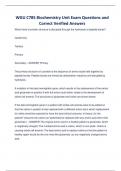
-
WGU C785 Biochemistry Unit Exam Questions and Correct Verified Answer
- Exam (elaborations) • 34 pages • 2024
-
- $12.99
- + learn more
Which level of protein structure is disrupted through the hydrolysis of peptide bonds? Quaternary Tertiary Primary Secondary - ANSWER Primary The primary structure of a protein is the sequence of amino acids held together by peptide bonds. Peptide bonds are formed by dehydration reactions and disrupted by hydrolysis.
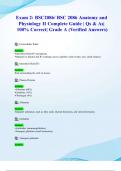
-
Exam 2: BSC2086/ BSC 2086 (Latest 2024/ 2025 Update) Anatomy and Physiology II Complete Guide | Qs & As| 100% Correct| Grade A (Verified Answers)
- Exam (elaborations) • 60 pages • 2024
- Available in package deal
-
- $10.99
- + learn more
Exam 2: BSC2086/ BSC 2086 (Latest 2024/ 2025 Update) Anatomy and Physiology II Complete Guide | Qs & As| 100% Correct| Grade A (Verified Answers) Q: Extracellular fluids Answer: •Interstitial fluid (IF) and plasma •Materials in plasma and IF exchange across capillary walls (water, ions, small solutes) Q: Interstitial fluid (IF) Answer: fluid surrounding the cells in tissues Q: Plasma Proteins Answer: •Albumins (60%) •Globulins (35%) •Fibrinogen (4%) Q: Al...
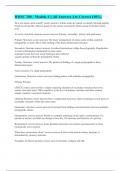
-
BMSC 200 - Module 4 || All Answers Are Correct 100%.
- Exam (elaborations) • 12 pages • 2024
- Available in package deal
-
- $10.99
- + learn more
How are amino acids joined? correct answers Amino acids are joined covalently through peptide bonds involving the carboxyl group of one amino acid and the amino group of another amino acid 4 Levels of protein structure correct answers Primary, secondary, tertiary and quaternary Primary Structure correct answers The linear arrangement of amino acids within a peptide, polypeptide or chain. But it tells nothing of the three-dimensional structure Secondary Structure correct answers Localize...
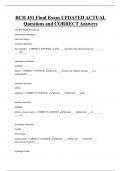
-
BCH 451 Final Exam UPDATED ACTUAL Questions and CORRECT Answers
- Exam (elaborations) • 19 pages • 2024
- Available in package deal
-
- $7.99
- + learn more
BCH 451 Final Exam UPDATED ACTUAL Questions and CORRECT Answers van der Waals interaction interatomic distances electron charge solution dielectric free energies - CORRECT ANSWER- the ___ describes the relation between ___, ___, ___ and ___ quaternary structure
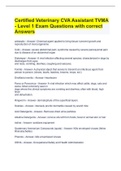
-
Certified Veterinary CVA Assistant TVMA - Level 1 Exam Questions with correct Answers
- Exam (elaborations) • 5 pages • 2023
- Available in package deal
-
- $9.99
- 4x sold
- + learn more
antiseptic - Answer- Chemical agent applied to living tissue t prevent growth and reproduction of microorganisms Colic - Answer- severe abdominal pain; syndrome caused by severe paroxsysmal pain due to disease of an abdominal organ Distemper - Answer- A viral infection affecting several species; characterized in dogs by discharges from eyes and nose, vomiting, diarrhea, coughing and seizures. Fomite - Answer- A physical object that serves to transmit an infectious agent from person to ...
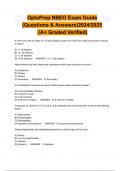
-
OptoPrep NBEO Exam Guide (Questions & Answers)2024/2025 (A+ Graded Verified)
- Exam (elaborations) • 48 pages • 2024
- Available in package deal
-
- $19.49
- + learn more
If a thin lens with an index of 1.5 has a dioptric power of +4.00 in air, what is its power if placed in water? A) +1.18 diopters B) +11.76 diopters C) +1.36 diopters D) +4.00 diopters - ANSWER C) +1.36 diopters Alpha helices and beta sheets are considered which level of protein structure? A) Quaternary B) Primary C) Tertiary D) Secondary - ANSWER D) Secondary An amphipathic molecule will react in what manner when exposed to water? A) It will completely dissolve ...
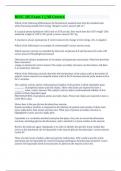
-
BIOC 385 Exam 1 || All Correct.
- Exam (elaborations) • 17 pages • 2024
- Available in package deal
-
- $13.09
- + learn more
Which of the following differentiates the biochemical standard state from the standard state when discussing standard free energy changes? correct answers pH of 7 If a typical person hydrolyzes 100.0 mol of ATP per day, how much does this ATP weigh? (The molecular weight of ATP is 507 g/mol.) correct answers 50.7 kg A reaction is always spontaneous if correct answers the change in free energy, ΔG, is negative. Which of the following is an example of a heterotroph? correct answers yeast...
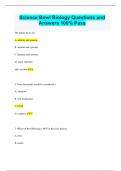
-
Science Bowl Biology Questions and Answers 100% Pass
- Exam (elaborations) • 30 pages • 2024
- Available in package deal
-
- $10.49
- + learn more
Science Bowl Biology Questions and Answers 100% Pass The purine bases are: A. adenine and guanine B. adenine and cytosine C. thymine and cytosine D. uracil, thymine, and cytosine A 2. Four chromatids would be considered a: A. mutation B. non-disjunction C. tetrad D. synapses C 3. Which of the following is NOT in the class insecta: A. bees B. moths C. fireflies D. spiders D 4. Plant cells differ from animal cells in that only plant cells possess: A. a nucleu...
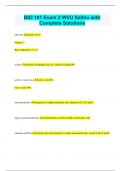
-
BIO 101 Exam 2 WVU Salihu with Complete Solutions
- Exam (elaborations) • 13 pages • 2024
- Available in package deal
-
- $9.99
- + learn more
BIO 101 Exam 2 WVU Salihu with Complete Solutions pH scale Acidic: 0-6.9 Neutral: 7 Basic (alkaline): 7.1-14 acidity amount of hydrogen ions in a solution (called pH) acids vs. bases ions acids- more H+ bases- more OH- macromolecules sequence of simple molecules; all composed of C, H, and O types of macromolecules carbohydrates, proteins, lipids, and nucleic acid elements in DNA contains the same elements as other macromolecules, except it has N and P monomers of compl...

How much did you already spend on Stuvia? Imagine there are plenty more of you out there paying for study notes, but this time YOU are the seller. Ka-ching! Discover all about earning on Stuvia


